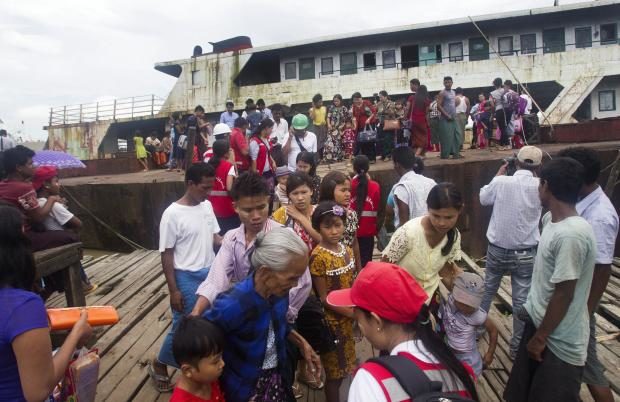Not just Rohingya, but also Buddhists, flee Myanmar violence

Fleeing Buddhist Rakhine residents arrive by ship from the unrest in Maungdaw region at the jetty, Tuesday, Aug. 29, 2017, in Sittwe, Rakhine State, western Myanmar. Recent violence in Myanmar’s western Rakhine State has driven thousands of Muslim ethnic Rohingyas fleeing toward Bangladesh for safety, but less noticed is a smaller exodus of Buddhists from the Rakhine minority. (Photo from AP)
BANGKOK — Violence in Myanmar’s western Rakhine state has driven thousands of ethnic Rohingya Muslims fleeing toward Bangladesh for safety, along with a smaller exodus of ethnic Rakhine Buddhists.
A majority of the country’s estimated one million Rohingya live in the northern part of Rakhine state, where Rohingya insurgents launched coordinated attacks last week against police posts, setting off allegedly brutal retaliation by government forces.
Human rights groups and advocates for the Rohingya say the army retaliated by burning down villages and shooting civilians. The government blames Rohingya insurgents for the violence, including the arson.
The official death toll in the violence was 96 as of Sunday, and the actual number is likely to be higher.
An estimated 8,000-9,000 Rohingya have entered Bangladesh since the violence broke out last Thursday, with an unknown number still waiting to cross the border or hiding in mountainous or forested areas.
Article continues after this advertisementNew York-based Human Rights Watch on Tuesday said satellite photos appear to show widespread burning in 10 areas of northern Rakhine. While the causes of the fires could not be ascertained, it noted that it “compared the locations of these fires with witness statements it has collected and media reports, and found a correlation with some reported incidents where residences have allegedly been deliberately burned.”
Article continues after this advertisementThe group urged the government to “grant access to independent monitors to determine the sources of fires and assess allegations of human rights violations.”
Tension has long been high between the Rohingya Muslims and Rakhine Buddhists, leading to bloody rioting in 2012.
Most of the violence since last week seems to be directed at Rohingya villages, but Rakhine Buddhists, feeling unsafe after the upsurge in fighting, are moving south to the state’s capital, Sittwe, where Buddhists are a majority and have greater security.
On Tuesday morning, scores crammed a ferry out of the area and headed for Sittwe. Many sat inside the cabin, but others sat or lay on the deck, swathed in bandages, and recounted their own moments of terror and violence.
Among them were five policemen heading to Sittwe for hospital treatment of wounds they said they received in wild skirmishes with insurgents during attacks on their positions. One was seriously hurt and lay still under a blanket.
All their injuries, they said, came from machete blows or slashes.
Zwe Phyo Aung said he went to support outnumbered police colleagues at an outpost in Myin Hlut village and found himself facing a wave of attackers armed with swords and knives.
“I wasn’t afraid of them; all I was thinking was to eliminate them. I wanted to eliminate them any way I could. I was not scared or frightened.”
His friend, Thar Kyaw Sein, said he was in the same desperate fight, during which his weapon jammed.
“The reason I was wounded was, when I was shooting with my gun, it had a problem. As I was fixing it and got up to shoot again, one of the guys came at me with his machete. So I shot him dead,” he said.
Seventy-year-old San Khine Pyu could not count herself so fortunate. Her only son — a policeman with 22 years’ service — was killed. In the midst of the seething atmosphere of hate and recrimination, she was trying to stay calm and keep her emotions in check.
“My son has died in the violence. As I am a Buddhist, I don’t want to blame anyone anymore,” she said.
A Rohingya insurgent group, the Arakan Rohingya Salvation Army, or ARSA, took responsibility for last week’s attacks on more than 25 locations, saying they were in defense of Rohingya communities.
The Rohingya have long faced severe discrimination and were the targets of violence in 2012 that killed hundreds and drove about 140,000 people — predominantly Rohingya — from their homes to camps for the internally displaced, where most remain.
The government refuses to recognize Rohingya as a legitimate native ethnic minority. Most Rohingya are denied citizenship and its rights.
The raids last Thursday night were deadlier than an attack by the militants on three border posts last October that killed nine policemen and set off months of brutal counterinsurgency operations by Myanmar security forces against Rohingya communities in Rakhine state. Human rights groups accused the army of carrying out massive human rights abuses, including killing, rape and burning down more than 1,000 homes and other buildings.
The army’s abuses fueled further resentment toward the government among the Rohingya. ARSA took advantage of the resentment by stepping up recruitment of members.